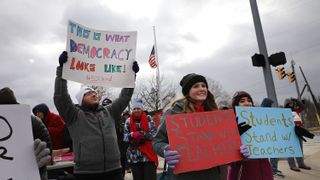For more than 13 months many Americans have been looking for ways to push back against the presidency of Donald Trump. Millions have taken to the streets in protest. Millions more have channelled outrage into online morality tales and the #resistance. What people are protesting – other than Trump himself – ranges across a wide-spectrum. From misogyny to commodified health care, in defence of immigrants and against police brutality, for greater regulations on firearms purchases to a less outwardly repugnant social discourse. Up until now, this protest has been unmoored from any systematic ability to effect change.
Whatever else the #resistance has done, it neither seems to have made Trump’s re-election any more unlikely nor energised the nearly 85.5 million Americans who saw no compelling reason to vote for either Donald Trump, Hillary Clinton or any of their third party challengers in 2016.
Despite the state playing the role of cultural and political bogeyman in so much elite American and international discourse, on February 22 around 20,000 West Virginia teachers and school support staff walked off their jobs in an unlawful and ultimately successful “wildcat” strike.
Last month, that may have begun to change. On first blush, West Virginia would seem more than a longshot to be at the heart of a progressive shift in American politics. Trump won the state by more than 40 percentage points, second only to Wyoming in margin of victory. Indeed, West Virginia, as the only American state that falls fully within Appalachia, became an easy stand-in for the ready-made and dominant — as well as categorically false — narrative of a declining white working class voting for misogyny, racism, xenophobia, and cultural conservatism against its economic interest. Yet, despite the state playing the role of cultural and political bogeyman in so much elite American and international discourse, on February 22 around 20,000 West Virginia teachers and school support staff walked off their jobs in an unlawful and ultimately successful “wildcat” strike.
These teachers did not strike because of Trump, or even his education policies, such as they exist. Rather, they risked their livelihoods, homes, insurance, and pensions for the most mundane of bread and butter issues — a relatively miniscule pay rise and the end to dramatically rising health insurance premiums. At a mean wage of US$45,200/year West Virginia teachers are the third lowest paid in the country despite teaching in some of the poorest and most underfunded schools in the nation. More importantly than their pay though, is the fact that their somewhat state-funded health care plan requires that they pay 20 per cent of their insurance out of pocket. As premiums rise, this means teachers are paying sometimes thousands more every year just to maintain health coverage. By contrast, Australia’s teachers average around AUD$65,000/year and receive state-funded Medicare.
In order to sustain their heroic work in such schools, many teachers in West Virginia and the nation are taking second and even third jobs just to get by, while the take-home pay for others is so low that they qualify for food stamps and government assistance. While state legislators refused to shore up health coverage and give teachers a pay rise that would barely keep up with inflation, the state lavished tax breaks on the natural gas, coal, and tourism industries, including at least three projects owned by Jim Justice, the state’s billionaire governor.
So what then does this strike in West Virginia have to do with Donald Trump and resistance to him and his policies? Nothing. And everything.
So what then does this strike in West Virginia have to do with Donald Trump and resistance to him and his policies? Nothing. And everything.
A broad-based attack on teachers’ rights and benefits, a deep devaluation of their professionalism and skills, and a commitment to making quality education a commodity rather than a right has been one area of deep bipartisan American agreement. Democrats under Barack Obama and Bill Clinton pursued such policies with similar vigour to Republicans under Trump and George W. Bush. A political world in which there is money for corporate tax giveaways — be they to oil and gas companies or the newest Amazon.com processing centre — but not for teachers to have a modicum of security and comfort is precisely the world in which those 85.5 million non-voters see no party or candidate as being able to make a difference in the lives of themselves or their children.
In the end, West Virginia’s teachers went back to work last week having won their desired pay rise while largely tabling for the time being reform of the state’s health plan. Their dramatic victory on pay issues and stalemate on health care made clear just how important a real universal health care program is for Americans and their ability to mobilise for effective change.
They also made clear that when teachers and others say enough is enough, when they come together and put their jobs, homes, health, and lives on the line for basic dignity, the power to shift the possibilities of politics is endless. By withholding their labour, West Virginia’s teachers gave the rest of America an object lesson in what real and effectual resistance looks like. It’s personally dangerous, it is something to fight for rather than against, and it opens up real possibility for not just defeating Trump, but how to change the very landscape of what is politically possible.






